Originally posted on December 24, 2023 @ 5:45 am
Are you craving the delicious tangy flavor of homemade sourdough bread but unsure where to find sourdough starter? Look no further than your local grocery store! While not all grocery stores carry it, there are options available for those looking to purchase sourdough starter conveniently.
Table of Contents
Key Takeaways:
- You can find fresh, ready-to-use sourdough starter at some grocery stores.
- Not all stores carry sourdough starter, so it’s best to check in advance.
- If your grocery store doesn’t have sourdough starter, you can purchase it online from reputable baking companies.
- You can also make your own sourdough starter at home using flour, water, and time.
- Consider the pros and cons of making your own starter versus buying one to find the best option for you.
Purchasing Sourdough Starter Online
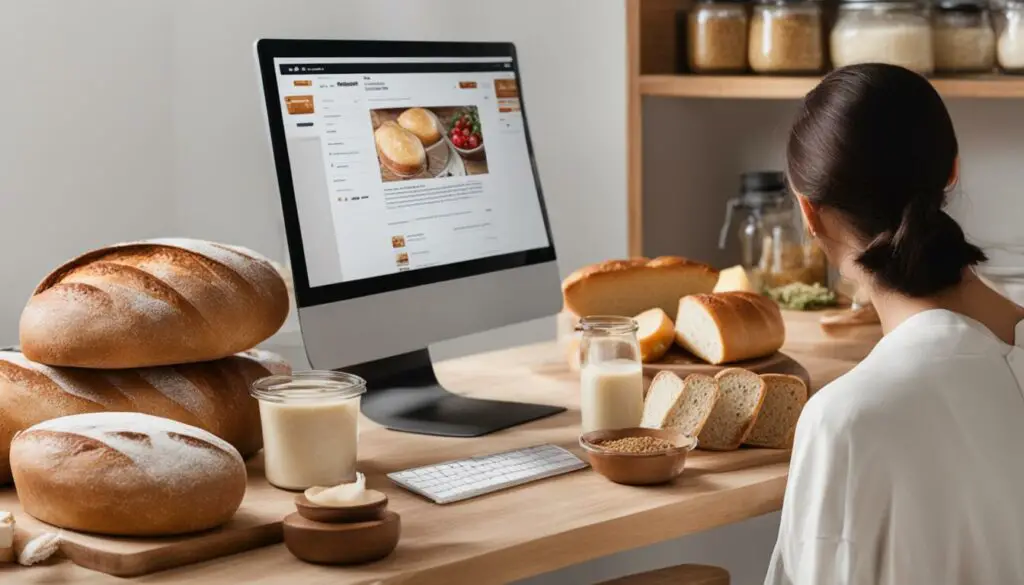
If your local grocery store doesn’t have sourdough starter, don’t worry! You can easily purchase it online from reputable baking companies and online marketplaces. This ensures you’ll have access to the sourdough starter you need to kick-start your baking adventures.
Reputable Baking Companies
Several renowned baking companies offer high-quality sourdough starter for sale on their websites. Companies like King Arthur Flour and Breadtopia provide a variety of starter options, allowing you to choose the one that fits your preferences. You can explore their websites and conveniently purchase the starter that catches your eye.
Did You Know?
King Arthur Flour, a trusted name in baking, offers a popular all-purpose sourdough baking blend that is loved by many home bakers.
Variety on Online Marketplaces
In addition to baking companies, online marketplaces like Amazon and Etsy offer a wide range of sourdough starters. These platforms give you access to unique cultures from different regions. You can explore the selection and find starters that offer distinctive flavors and characteristics, perfect for adding a touch of diversity to your baking.
Insider Tip:
Browsing through online marketplaces can be a fun and exciting experience, as you may come across rare and artisanal sourdough starters that are not commonly found in stores.
Comparison Table: Purchasing Sourdough Starter Online
| Company/Marketplace | Sourdough Starter Options | Price Range | Shipping Availability |
|---|---|---|---|
| King Arthur Flour | All-purpose baking blend, whole wheat, rye, and more | $10 – $20 | Ships nationwide within the United States |
| Breadtopia | San Francisco, Vermont, and other regional starters | $12 – $25 | Ships to the United States and internationally |
| Amazon | Various sellers offering different starter cultures | Varies (depends on seller) | Availability may vary based on seller |
| Etsy | Artisanal and unique starters from independent sellers | Varies (depends on seller) | Availability may vary based on seller |
Table: Comparison of purchasing sourdough starter online from different sources.
As seen in the comparison table, each source offers different starter options at varying price points, giving you a range of choices to fit your budget and preferences. Make sure to check the shipping availability when purchasing from specific companies or sellers.
Whether you choose to buy from reputable baking companies or explore unique cultures on online marketplaces, purchasing sourdough starter online provides a convenient way to acquire the starter you need to embark on your sourdough baking journey.
Making Your Own Sourdough Starter
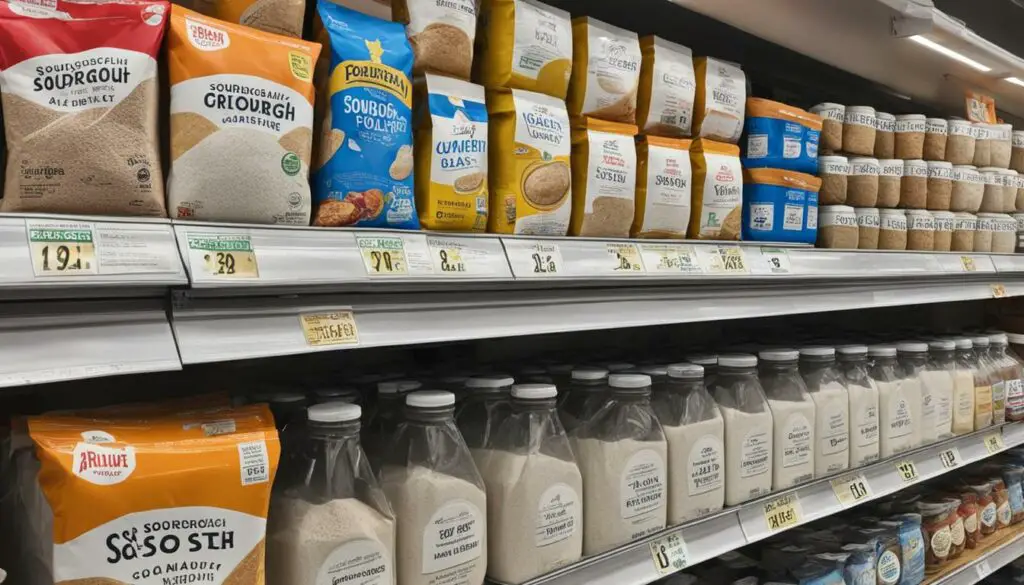
If you prefer a DIY approach, you can make your own sourdough starter at home. All you need is flour, water, and time. It’s a simple process that allows you to cultivate your own unique culture that suits your preferences.
To begin, you’ll need a container to house your starter. A glass jar or food-safe plastic container works well. Make sure it has enough room for the starter to grow as it becomes active.
Ingredients:
- 1 cup all-purpose flour
- 1/2 cup filtered water
Instructions:
- Combine the flour and water in the container, mixing until well combined. The mixture should resemble a thick pancake batter.
- Cover the container loosely with a breathable lid or a piece of clean cloth secured with a rubber band.
- Place the container in a warm spot, ideally around 70°F to 85°F (21°C to 29°C). Avoid direct sunlight or extreme temperature fluctuations.
- Every 24 hours, discard about half of the starter and add 1/2 cup of flour and 1/4 cup of water. Stir well to incorporate the new ingredients.
- Repeat this process daily for about 5 to 7 days, or until your starter becomes active. You’ll notice bubbles forming and a tangy aroma developing.
Once your starter is active, it’s ready to use in your sourdough baking adventures. But remember, maintaining a sourdough starter requires regular feeding to keep it healthy and active. Feed your starter with equal parts flour and water (by weight) at least once a week to keep it thriving.
Keep in mind that the process of creating a sourdough starter can vary depending on factors like temperature and humidity. Don’t be discouraged if your starter takes a bit longer to become active. With time and patience, you’ll be rewarded with a vibrant and flavorful sourdough starter of your own creation.
Pros of Making Your Own Sourdough Starter
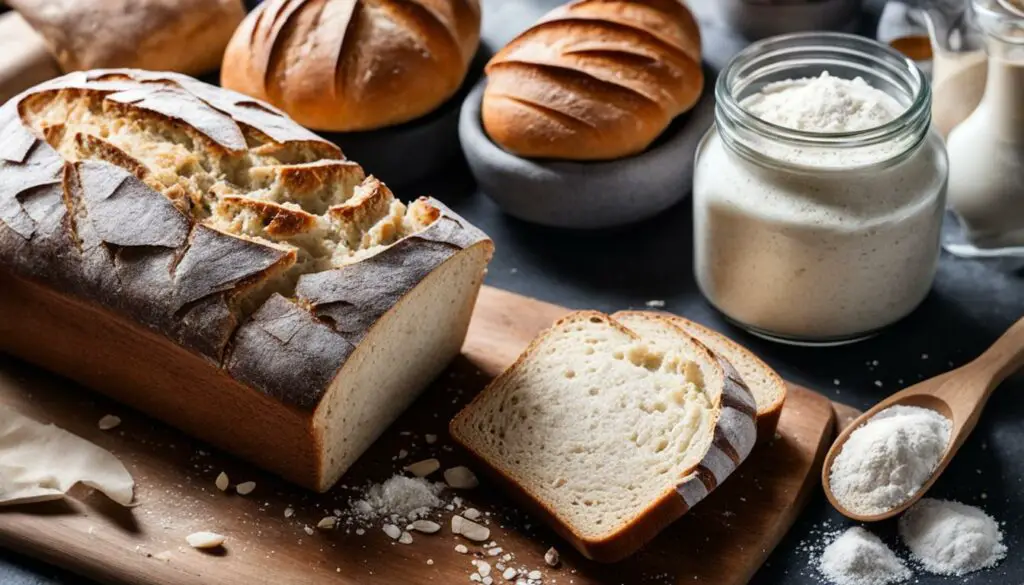
Making your own sourdough starter offers several advantages. Firstly, it gives you a sense of personal satisfaction and accomplishment. You have complete control over the flavor profile of your starter, and you can customize it to your liking.
“Creating your own sourdough starter allows you to be a true artisan baker, offering a unique creation that reflects your taste preferences and baking style.”
Additionally, you know the history and origin of your starter, which can be a fascinating story to share. Imagine serving your homemade sourdough bread and telling your guests about how it all started with a simple mixture of flour and water in your own kitchen.
“The process of making your own sourdough starter becomes a story of transformation, from humble ingredients to a living culture that adds character and depth to your bread.”
Another benefit of making your own starter is the ability to use the discard to make delicious baked goods like pancakes and waffles. Instead of wasting any excess starter, you can repurpose it and create flavorful treats that the whole family will enjoy.
Create Unique Flavors
When you make your own sourdough starter, you have the opportunity to experiment with different flours and hydration levels to create unique flavors. You can try adding rye flour for a deeper, earthy taste or whole wheat flour for a nuttier flavor. By adjusting the hydration, you can achieve a denser or airier texture in your bread.
Complete Control Over Fermentation
One of the key benefits of making your own sourdough starter is having full control over the fermentation process. You can determine how long to feed and nurture your starter, allowing it to develop the desired level of acidity and complexity. This control empowers you to craft artisanal bread with the perfect balance of tanginess and flavor.
Cost-Effective Option
Making your own sourdough starter is a cost-effective option compared to purchasing one. With just a small amount of flour and water, you can create a starter that will provide you with countless batches of delicious bread. It’s a budget-friendly way to embark on your sourdough baking journey.
| Pros of Making Your Own Sourdough Starter |
|---|
| Sense of personal satisfaction and accomplishment |
| Customize the flavor profile to your liking |
| Know the history and origin of your starter |
| Repurpose discard for delicious baked goods |
| Experiment and create unique flavors |
| Control over fermentation process |
| Cost-effective option |
By making your own sourdough starter, you not only gain control over the baking process but also experience the joy and fulfillment of creating something from scratch. It’s a journey of discovery, experimentation, and ultimately, a reward in the form of freshly baked sourdough bread that is uniquely yours.
Cons of Making Your Own Sourdough Starter
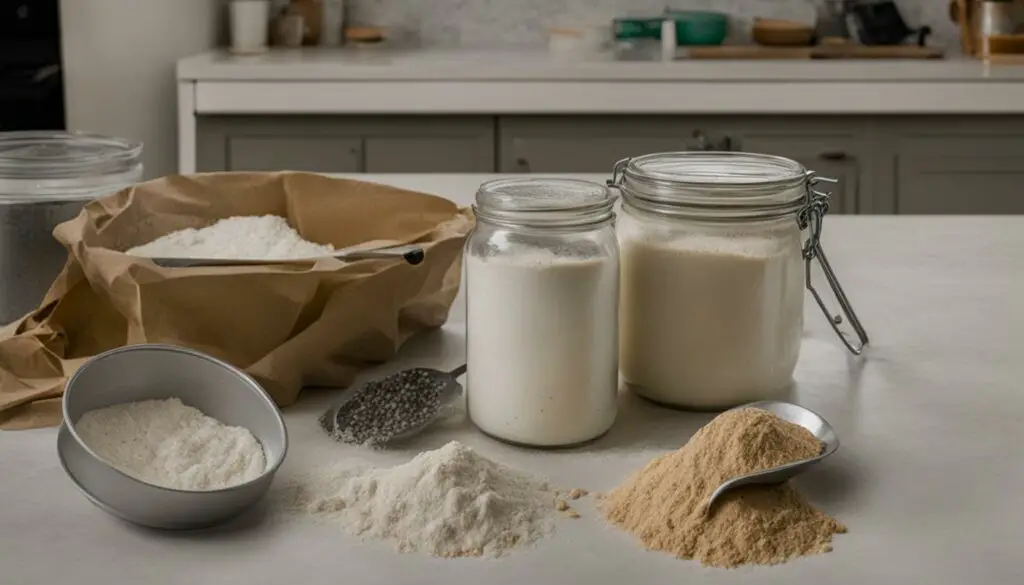
While embarking on the journey of making your own sourdough starter can be immensely gratifying, it’s important to be aware of the challenges that come along. Here are a few cons and considerations to keep in mind:
- Time-Consuming Process: Creating a sourdough starter from scratch requires patience and dedication. It can take several weeks or even months of daily feeding and attention until the starter reaches maturity.
- Troubleshooting Challenges: Making your own starter involves working with a living organism, which means there may be obstacles along the way. Dealing with a stalled or unhealthy starter can be frustrating and require troubleshooting to get it back on track.
- Messy and Distinct Smell: Working with a live culture like sourdough can be messy. You’ll have to handle and maintain the starter, which might result in flour spills or sticky dough. Additionally, sourdough has a distinct smell that some might find unpleasant.
Despite these cons, many bakers find the process of making their own sourdough starter rewarding and well worth the effort. It allows for a deeper understanding and connection with the bread-making process.
“Making your own sourdough starter requires time, patience, and determination. But the sense of accomplishment and control over the process make it all worthwhile.”
Buying a Sourdough Starter
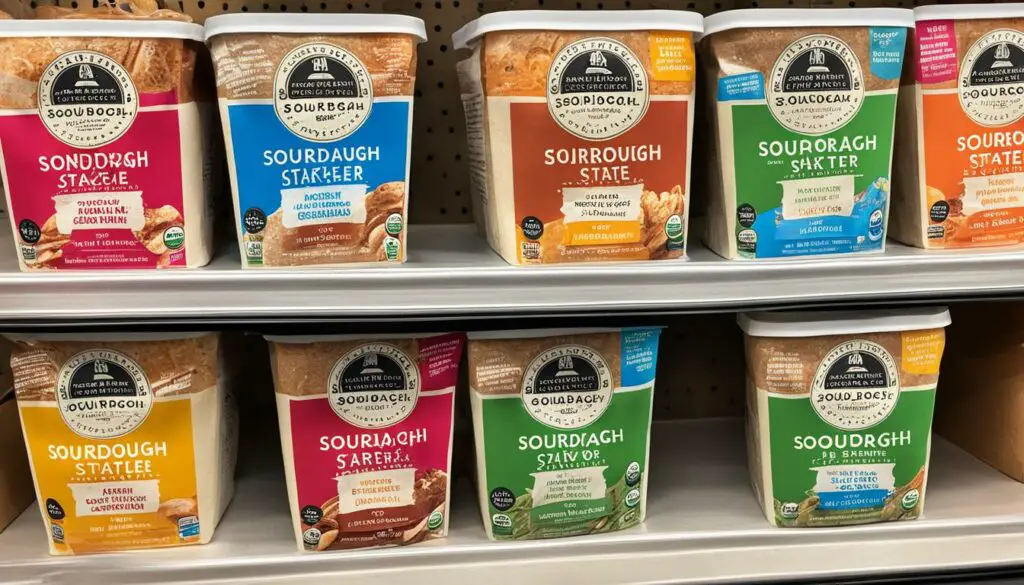
Apart from purchasing sourdough starter online, you might also find it available for sale in some supermarkets. While not all grocery stores carry it, it’s worth checking the baking aisle or specialty food section for pre-packaged sourdough starter. This option provides a convenient way to jump-start your sourdough baking journey without the need to create a starter from scratch.
Buying sourdough starter at the supermarket can save you time and effort, especially if you’re new to sourdough baking or prefer the convenience of a pre-made starter. It allows you to skip the process of creating and nurturing a starter from scratch, providing you with a reliable and active culture to begin your sourdough adventures.
When looking for sourdough starter at the supermarket, keep in mind that not all stores carry it. It’s more commonly found in larger grocery stores or specialty food shops that cater to baking enthusiasts. If you’re unsure whether your local supermarket stocks sourdough starter, don’t hesitate to ask a store employee. They can direct you to the appropriate aisle or let you know if it’s available upon request.
Here are some key benefits of buying a sourdough starter from the supermarket:
- Convenience: Buying a pre-packaged sourdough starter allows you to start baking with sourdough immediately, without the need to wait several days or weeks for a homemade starter to become mature.
- Reliable Quality: Supermarkets usually source their products from reputable suppliers, ensuring that the sourdough starter you purchase is of good quality and has been properly maintained.
- Variety: Some supermarkets may offer a selection of different sourdough starter brands or types, allowing you to choose one that suits your personal taste and culinary preferences.
Remember, buying sourdough starter from the supermarket is just one option among many. If you prefer a more hands-on approach or want to create a unique starter with specific characteristics, you can still consider making your own sourdough starter or acquiring one from a friend or online community.
Pros and Cons of Buying a Sourdough Starter
| Pros of Buying a Sourdough Starter | Cons of Buying a Sourdough Starter |
|---|---|
| You can start baking with sourdough immediately. | You might not know the exact history or origin of the starter. |
| The starter is typically reliable and active. | If the starter is dehydrated, it needs to be rehydrated and fed before use. |
| A wide variety of sourdough starters may be available. | You may have limited options depending on local supermarket availability. |
Pros of Buying a Sourdough Starter
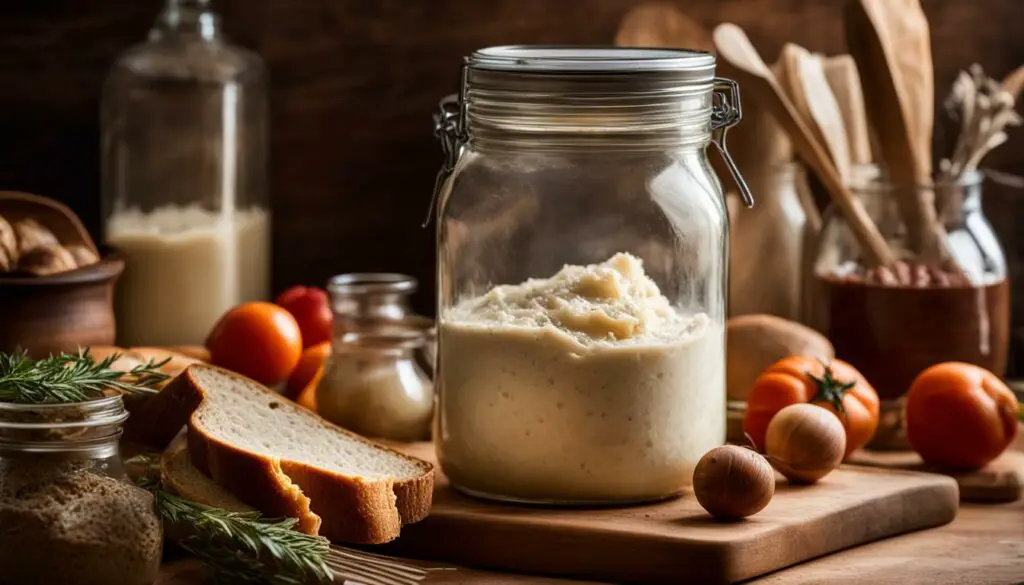
Buying a sourdough starter offers several advantages. One of the main benefits is the ability to start baking with sourdough immediately, as the pre-packaged starters are typically ready to use. This eliminates the time and effort required to create a starter from scratch. Additionally, purchasing a starter from a reputable source can give you confidence in its quality and reliability.
If you’re eager to dive into the world of sourdough baking without the wait, buying a starter is the perfect solution. With a store-bought starter, you can skip the initial feeding and fermentation stages, saving valuable time. This convenience is especially beneficial for busy individuals or those with limited availability to devote to the sourdough starter creation process.
“The convenience of buying a sourdough starter means that you can start baking delicious and tangy sourdough bread right away, without having to go through the steps of making your own starter. It’s a great option for those who want to experience the joys of homemade sourdough without the wait.” – Sarah Baker, experienced sourdough baker
Another advantage of buying a sourdough starter is the assurance of its quality and reliability. Reputable sources often provide starters that have been carefully cultivated and maintained, ensuring consistent results. When purchasing from trusted brands or suppliers, you can have peace of mind knowing that your starter is healthy, vigorous, and capable of producing excellent sourdough bread.
Pros of Buying a Sourdough Starter
| Advantages | Description |
|---|---|
| Immediate baking | Ready-to-use starters allow you to start baking without delay. |
| Time-saving | Skip the process of creating a sourdough starter from scratch. |
| Assured quality | Purchasing from reputable sources ensures a reliable and healthy starter. |
By buying a sourdough starter, you gain the convenience of immediate baking and the confidence of using a reliable starter. Whether you’re a seasoned baker or a beginner, this option allows you to enjoy the rewards of homemade sourdough without the time-consuming process of developing and nurturing your own starter.
Cons of Buying a Sourdough Starter
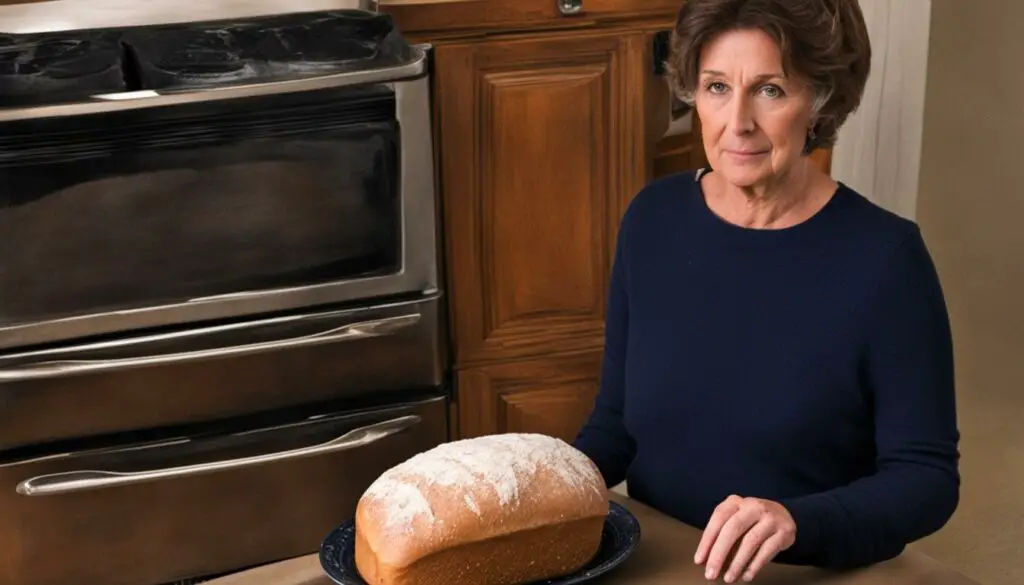
When purchasing a sourdough starter, it’s important to consider a few factors that may be seen as downsides. While buying a starter can be a convenient option, there are a few potential drawbacks to keep in mind.
Uncertainty about History and Origin
One of the main cons of buying a sourdough starter is that you might not know the exact history or origin of the starter, especially if purchasing from a less reputable source. Understanding the lineage of the starter can be important for some bakers, as it provides insight into the flavor profile and characteristics of the culture.
“When you buy a sourdough starter, you may not have a complete understanding of where it came from or how it was developed. This lack of knowledge can make it challenging to troubleshoot or modify the starter to suit your baking preferences.”
Rehydration and Feeding Required with Dehydrated Starters
If you opt for a dehydrated sourdough starter, you’ll need to rehydrate it and feed it before it becomes active. This process can take several days and requires careful attention to ensure the starter is properly revived. It may require additional time and effort compared to using a ready-to-use starter.
| Cons of Buying a Sourdough Starter | |
|---|---|
| You may not know the exact history or origin of the starter. | ⭐⭐⭐ |
| Rehydration and feeding are required for dehydrated starters. | ⭐⭐ |
It’s important to note that these cons can be mitigated by choosing a reliable seller who provides transparency about the starter’s origin or by opting for a fresh, ready-to-use starter from a reputable source.
While there are considerations when purchasing a sourdough starter, it ultimately depends on your personal preferences and the level of control you desire over your starter’s history and development.
Other Ways to Acquire a Sourdough Starter
If you don’t want to make or buy a sourdough starter, there are other ways to acquire one. Let’s explore some alternative options:
Ask a Friend
Do you have a friend who bakes sourdough? Reach out and ask if they would be willing to share their starter with you. Many avid bakers regularly discard a portion of their starter during the feeding process and are more than happy to pass it along to fellow bread enthusiasts.
Online Communities and Groups
Joining online communities and groups focused on sourdough baking can be a great way to connect with like-minded individuals. These communities often have members who offer to send each other dried or dehydrated starters for free, making it a convenient and cost-effective way to acquire a starter. Look for dedicated sourdough forums, Facebook groups, or online baking communities to get started.
By exploring these routes, you can find a sourdough starter without having to make or buy one. Whether you receive a starter from a friend or participate in online sharing communities, you’ll be able to embark on your sourdough baking journey without the hassle of creating a starter from scratch.
Considerations for Success with Sourdough Starter
Whether you make, buy, or acquire a sourdough starter, there are a few key considerations to ensure your success in the sourdough baking journey. Here are some tips and recommendations:
Maintain a Clean Environment
To promote a healthy and thriving sourdough starter, it’s important to keep your equipment and workspace clean. Use a clean jar or container to house your starter, free from any residue or contaminants that may interfere with fermentation. Regularly clean your utensils, such as stirring tools, to prevent the introduction of unwanted bacteria.
Accurate Measuring Equipment
Consistency is crucial when it comes to sourdough baking. Invest in accurate measuring equipment, such as digital scales, to ensure precise measurements of flour and water. This will help maintain the correct hydration level and overall consistency of your sourdough starter.
Stirring Utensils
While not essential, having a dedicated stirring utensil can be helpful for maintaining your sourdough starter. A clean knife or chopstick can be used to stir the starter during feeding and ensure proper distribution of ingredients.
Specialized Sourdough Starter Equipment
If you’re ready to take your sourdough journey to the next level, there are specialized equipment options available. Consider investing in sourdough starter jars with built-in thermometers, which allow you to monitor the temperature of your starter easily. Mini spatulas designed specifically for sourdough starter can also aid in mixing and portioning your starter.
| Equipment | Description |
|---|---|
| Sourdough Starter Jars with Built-in Thermometers | Airtight jars with built-in thermometers to monitor the temperature of your starter. |
| Mini Spatulas | Small spatulas designed specifically for portioning and mixing sourdough starter. |
By implementing these tips and utilizing specialized equipment if desired, you can set yourself up for success with your sourdough starter. Remember, consistency, cleanliness, and precision are key to nurturing a healthy and thriving starter.
Conclusion
Whether you’re a baking enthusiast or a beginner, finding the right sourdough starter is essential for your bread-making journey. Luckily, there are different options available to suit your preferences and baking goals.
If you enjoy the process of creating something from scratch and having control over every aspect, making your own sourdough starter is a great choice. Not only does it allow for customization and personal satisfaction, but it’s also a chance to experiment with different flours and feeding schedules to achieve the flavor profile you desire.
On the other hand, if convenience is your priority, purchasing a ready-to-use sourdough starter is the way to go. With various online retailers and even some grocery stores offering packages of sourdough starter, you can jump right into baking without the waiting period of building your own starter from scratch.
When making a decision, consider the pros and cons of each method and explore different sources. Whether you make, buy, or acquire a sourdough starter from a friend or online community, the key is to find the right one that suits your needs and preferences. So get ready to embark on your sourdough baking adventure and enjoy the delicious results!
FAQ
Can I buy sourdough starter at the grocery store?
While not all grocery stores carry it, some do offer fresh sourdough starter in the baking aisle or specialty food section. If your local store does not have it, you can also try purchasing it online.
Where can I buy sourdough starter?
You can purchase sourdough starter online from reputable baking companies like King Arthur Flour and Breadtopia. Online marketplaces like Amazon and Etsy also offer a variety of sourdough starters for sale.
Can I make my own sourdough starter at home?
Yes, making your own sourdough starter at home is a popular option. All you need is flour, water, and time. There are many tutorials and recipes available online that provide step-by-step instructions for creating your own starter.
What are the benefits of making my own sourdough starter?
Making your own sourdough starter allows you to have full control over the flavor profile and customization options. It also gives you a sense of personal satisfaction and accomplishment. You can use the discard to make delicious baked goods like pancakes and waffles.
What are the challenges of making my own sourdough starter?
Making your own sourdough starter can be time-consuming, requiring daily feeding and attention for several months until it is mature. Troubleshooting issues that may arise, such as a stalled or unhealthy starter, can also be frustrating. Working with a live culture like sourdough can be messy and may have a distinct smell.
Can I buy a sourdough starter at the supermarket?
Some supermarkets may carry pre-packaged sourdough starter in the baking aisle or specialty food section. However, not all grocery stores offer it, so it’s best to check availability beforehand.
What are the benefits of buying a sourdough starter?
Buying a sourdough starter offers the advantage of immediate baking possibilities, as pre-packaged starters are typically ready to use. It eliminates the time and effort required to create a starter from scratch. Purchasing from a reputable source can also provide confidence in its quality and reliability.
What should I consider when buying a sourdough starter?
When buying a sourdough starter, consider the source and its reputation. If purchasing a dehydrated starter, you’ll need to rehydrate and feed it before it becomes active. Choosing a reliable seller is important to ensure you’re getting a quality product.
Are there other ways to acquire a sourdough starter?
If you don’t want to make or buy a sourdough starter, you can ask a friend who bakes sourdough if they would be willing to share their starter with you. You can also explore online communities and groups where members often offer to send each other dried or dehydrated starters for free.
What should I consider for success with sourdough starter?
It’s essential to have a clean jar to house your starter, as well as accurate measuring equipment like digital scales. Stirring utensils, such as a clean knife or chopstick, are also helpful. Specialized equipment like sourdough starter jars with built-in thermometers and mini spatulas can be considered for more precision.
How do I find the right sourdough starter for my needs?
Whether you make, buy, or acquire a sourdough starter, there are options available to suit your preferences and baking goals. By considering the pros and cons of each method and exploring different sources, you can find the right sourdough starter that aligns with your needs and preferences.
Source Links
- https://shop.kingarthurbaking.com/items/classic-fresh-sourdough-starter
- https://goeatyourbreadwithjoy.com/sourdough-starter/
- https://www.pantrymama.com/is-it-better-to-make-a-sourdough-starter-or-buy-one/
See also:
Leave a Reply